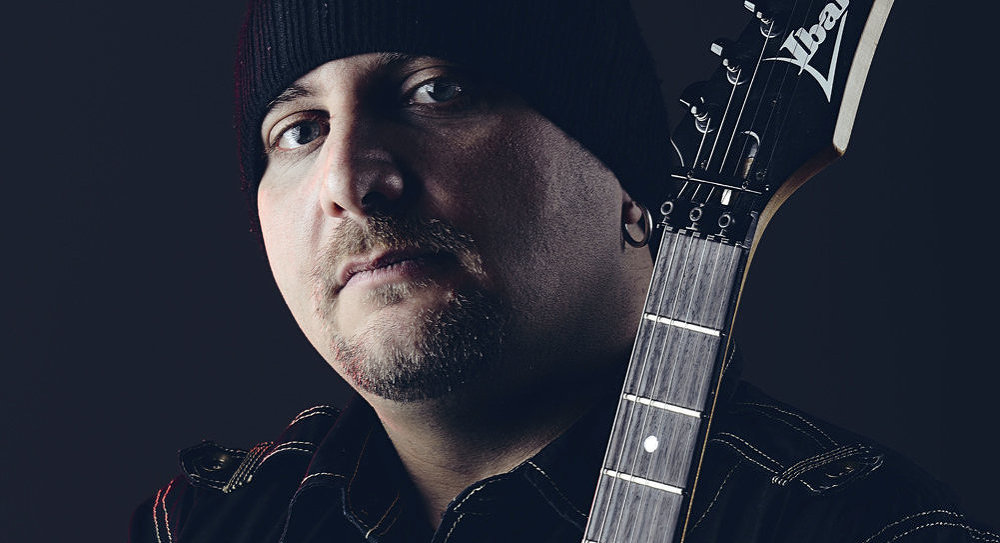— You played metal for such a long time, and then, suddenly, your name appeared on the cover of Virgil Donati's In This Life album. How did you make acquaintance with fusion and did you like it?
— This isn't my main style. Jazz isn't my music. Maybe because I've never studied it. When I studied at music college, I preferred blues — that's the kind of music that makes you a performer with feeling, teaches phrasing and rhythm. But you know, I really like playing fusion.
As I never understood jazz in terms of theory, that was a challenge of sorts for me. Ten years ago, I was working with a brilliant keyboardist, Alex Argento. Back then, he was recording his first solo album. It was he who pushed me towards fusion. I had never played that sort of music before. Frankly, I had never even listened to it. When he gave me his stuff to listen to, I asked him: "Are you sure I am the right guy for this? After all, I play quite different music." I wasn't absolutely certain that I would be able to play the compositions correctly, do the phrasing properly and improvise. He replied: "Just be yourself. Take it as a challenge. Listen to several recordings and try to squeeze maximum out of the material and your manner of playing." That's how I got acquainted with fusion.
I spent several months listening to this music. I analyzed every phrase and every note to grasp this style. When I felt ready, I started to do test recordings.
Even now, though I am already fairly experienced in this genre, playing fusion is still a challenge of sorts for me. When Virgil Donati invited me to participate in the recording of his solo album In This Life, I again had to immerse myself into this music and rehearse a lot, as I hadn't played fusion for several years by that time. I think that a musician should be diversely developed and be capable of recording different genres of music.
— Did that experience help you?
— Yes, certainly. I spent a lot of time studying the nuances of fusion. Now, I use these skills subconsciously in any music I play — to a different extent, of course. Since I perceived fusion as a challenge that I had yet to take, learning to play it improved my playing skills in general. I knew that my efforts would be rewarded, that I would end up a better musician.
I am not sure that I will make a cool fusion guitarist, as, after all, I am a fan of different music, yet I think I was right to take up that challenge.
Today, I am engaged in another fusion project, together with an excellent Russian bass guitarist, Anton Davidyants, and Alex Argento, whom I mentioned earlier. Two fusion-guitarists — Alessandro Benvenuti and Tom Quayle — are present at recording, so it seems that I'm the only one who is from a different music world, but when I send my recorded material to Alex for mixing, he often says: "It's good to have a different view."
— If a jazzman starts playing metal and a metalhead starts playing jazz, which of them will find it easier to do?
— That's a difficult question. I know a few metalheads who moved into jazz. They spent years training, for there's no learning jazz phrasing overnight. It's an entirely different world: one needs to accumulate a sufficient vocabulary and to work very hard to pass from playing scales to real jazz. That's why I would say that a jazzman will find it easier to start playing metal.
But don't get me wrong, I am not saying that playing metal is easier. There is much more to it than just power chords or sound. If we talk about Slayer or Iron Maiden, for instance, then yes, a jazzman will find it easier, but still will not become a true metalhead. When you listen to such musicians, you immediately realize that they came from jazz: they have different mentality and use a different guitar tone, not the one that is needed. Both a jazzman and a metalhead will have to study the genre: theory, improvisation, structure, and so on.
— Blues gave birth to jazz, rock and early heavy metal. Today, most modern rock bands, such as Animals as Leaders, play a kind of heavy metal that is rooted in jazz. What's your take on that?
— It's called math-metal. This is mathematical music.
— Don't you think that it closely resembles jazz in form, improvisation and freedom?
— True. Compared with the other heavy metal styles, this one is freer — there is no clear-cut structure, no clear-cut arrangement. As in jazz, everything depends on the performers and their emotional state at that moment. The only difference is sound. That's what always interested me, I would even say intrigued me, in such groups as Animals as Leaders, Tesseract, Periphery. They are so different, yet they have that mix in common. I adore it. Frankly, I think that this is a new modern trend. I agree with you, this music came from jazz. Yet, it should be remembered that blues, too, is the forefather of jazz. So you see everything is interconnected.
